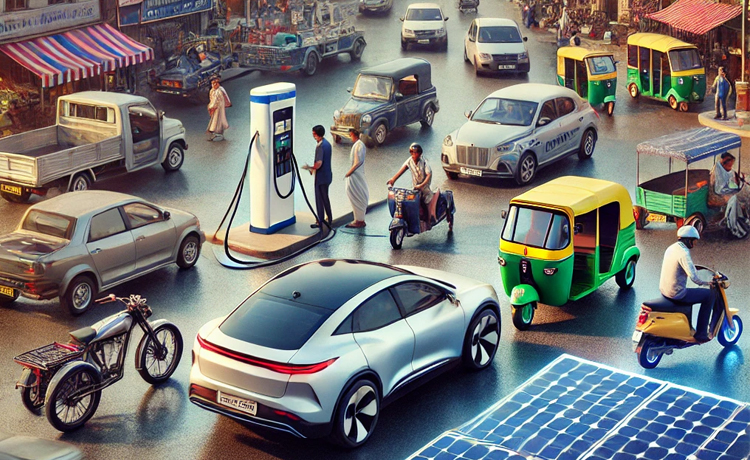
2024 was a year of big launches and in many ways, it was also a year that gave a glimpse of what a fully electric future will look like. Well, 2025 is here and as we look ahead at the launches lined up ahead, it seems set to be a year of immense excitement. Buckle up for a look at the hottest trends that I think are set to transform the automotive industry and pave the way for a groundbreaking driving experience.
Electric Vehicles Take the Wheel

The most electrifying trend is the undeniable surge in electric vehicles (EVs). These clean machines are no longer niche; they’re zooming towards dominance. Automakers are churning out EVs across all categories, and with battery tech constantly evolving, these eco-friendly rides are becoming more affordable and practical than ever. Plus, the growing network of charging stations is making range anxiety a thing of the past.
Self-Driving Cars: From Sci-Fi to Reality
Self-driving cars are swarming certain areas in the US. Get ready to see them on Indian roads soon! The development of autonomous vehicles (AVs) is picking up speed, with features like advanced driver-assistance systems (think automated emergency braking and lane-keeping assist) already becoming commonplace. Pretty soon, you’ll be sharing the road with vehicles that can practically drive themselves – 2025 is laying the groundwork for a future filled with self-driving cars.
Going Green: Sustainability Takes the Podium

Sustainability is no longer an afterthought; it’s a core driving force in the automotive industry. Environmental responsibility is a major motivator for both regulators and consumers, pushing automakers to adopt eco-friendly practices throughout the entire vehicle lifecycle. This means everything from using recycled materials in car parts to developing cleaner manufacturing processes and exploring second-life applications for EV batteries.
Connecting the Ride: The Rise of Networked Cars
Get ready to see cars that function as mobile data hubs! The rise of connected cars is transforming the driving experience by enabling vehicles to communicate with each other and their surroundings. This Vehicle-to-Everything (V2X) technology allows cars to exchange real-time data, which will be a game-changer for safety, traffic management, and route planning. Imagine a world where cars can warn each other of hazards or automatically adjust speed for a smoother traffic flow – that’s the future of V2X communication.
Mobility on Demand: Sharing the Road, Sharing the Ride

In a world grappling with traffic congestion, car ownership isn’t always the most practical option. That’s where shared mobility comes in. Subscription-based services and car-sharing platforms are experiencing a resurgence, offering drivers more flexible and economical transportation options. This trend extends to micromobility solutions like electric scooters and bikes, providing a convenient and eco-friendly way to get around town.
Powering Up the Future: Advanced Battery Technology
The EV revolution wouldn’t be possible without cutting-edge battery tech. Solid-state batteries are the next big thing, boasting higher energy densities and faster charging times than traditional lithium-ion batteries. They also offer a significant safety upgrade by eliminating the flammable liquids found in conventional batteries. And researchers aren’t just focused on developing next-gen batteries; responsible battery recycling is also a top priority. As the demand for EVs grows, so does the need for efficient systems to recover and reuse materials from used batteries.
AI and Machine Learning: Taking the Wheel of Innovation

Artificial intelligence (AI) and machine learning (ML) are no longer the stuff of science fiction. These powerful technologies are playing a transformative role in everything from car manufacturing to vehicle operations. AI can analyse data from car sensors to predict mechanical problems before they arise, preventing breakdowns and improving overall vehicle performance. In self-driving cars, AI is the brain behind the wheel, enabling vehicles to interpret sensor data, navigate roads, and make split-second decisions. AI is also optimising production lines, streamlining supply chains, and managing fleet operations.
5G: Gearing Up for the Future
Get ready for blazing-fast data speeds on the go! The integration of 5G technology into vehicles is opening new doors for autonomous driving and V2X communication. With its superior bandwidth, 5G will further enhance the capabilities of self-driving cars and allow for seamless data exchange between vehicles and their surroundings. But 5G isn’t just about making self-driving cars smarter; it’s also about making the in-car experience more immersive. Passengers will be able to stream high-definition content, participate in video calls, and access cloud-based applications with virtually no lag.
Personalisation: A Tailored Ride Every Time

Imagine a car that adjusts to your every whim! Automakers are developing ways to create a more personalised in-car experience by leveraging driver data and preferences. A vehicle could automatically set your preferred seat position, climate control, and infotainment options based on your preferences.

